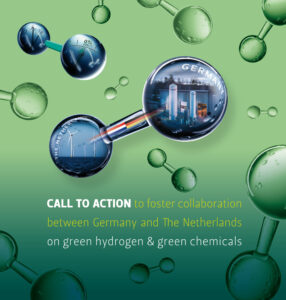The Hague, 8 April 2021
During the InnovatieExpo 2021, Minister Bas van ‘t Wout received from ECCM chair Richard van de Sanden, a call to action for bilateral collaboration in green hydrogen and green chemicals between Germany and The Netherlands. This call to action will be used as a basis to set up a joint innovation programme for collaboration between industry and knowledge institutes across the border. “We have each other a lot to offer with respect to first class knowledge, infrastructure and vital industrial clusters to make the transition really happen”, emphasizes Van ‘t Wout. The Dutch Research Council NWO will contribute five million euro to the bilateral collaboration via the mission driven innovation policy of the Dutch government.
The bilateral call to action pinpoints where the interesting leads are for public-private collaboration. Germany and The Netherlands have a lot to offer to each other. Germany has unique R&D and innovation infrastructure and several boosting national initiatives like the excellence clusters, Kopernikus projects, living labs and energy research networks. The Netherlands knows how to bring together innovation, societal challenges and earning capacity in its mission-driven innovation policy. The Netherlands has a high-quality chemical industry and manufacturing industry, a strong knowledge position and, with its ports and gas infrastructure, an ideal starting position for hydrogen.
The call to action is an initiative of a public-private bilateral committee, chaired by Matthias Wessling, professor in chemical engineering from RWTH Aachen University. Wessling, who held a professorship at the University of Twente in the past and knows the Dutch ecosystem very well: “In the Netherlands interdisciplinary and cross-sectoral collaboration is embedded in the mentality. As a relative small country with an open economy, The Netherlands regard innovate technology as an important export product.”
Upscaling collaboration
International cooperation is necessary to make a big impact. The reasons to intensify bilateral collaboration on hydrogen and electrochemical conversion processes in industry are numerous. “The brightest minds from science and industry need to come together now to ensure that green hydrogen quickly becomes a commercially viable option”, states Dr Stefan Kaufmann, member of the German Bundestag and Innovation Commissioner for Green Hydrogen at the Federal Ministry of Education and Research (BMBF). “We can only develop the clout power needed in the light of international competition if we all work together”, continues Kaufmann.
Stepping stone for further collaboration
Input for the bilateral call to action was collected during a virtual workshop in October 2020 in Vaals (The Netherlands), where hundred invited experts from industry, knowledge institutes, regions and governments exchanged visions and priorities on hydrogen and green electrons for a future sustainable industry. From Dutch side the bilateral committee was initiated and staffed by ECCM (the National Advisory Committee on Electrochemical Conversion & Materials). ECCM committee members Richard van de Sanden and Marco Waas are the Dutch delegates for the bilateral committee.
In 2019, the Netherlands was Germany’s second most important trading partner within the EU after France and the fourth most important worldwide. The bilateral trade volume was around 189 billion euros in 2018. Germany is one of the Netherlands’ most important trading partners.
Renewable electricity for hydrogen and chemicals
The call to action addresses the electrochemical, technological and socio-economic solutions needed to sustainably fulfil our future needs for fuels and chemical products. In addition, the call to action focuses on chemically stored renewable energy to balance the grid to cope for the intermittency in renewably energy supply. Our demand for fuels for aviation, shipping and heavy road transport and for chemical products and materials are now responsible for more than 35% of global CO2 emissions. Producing these fuels and chemicals from renewable electricity and biomass/CO2 feedstock is a huge challenge, but an essential part of achieving our climate goals.
From MoU to innovation pact
On the 2nd of October 2019 the German and Dutch governments signed a Memorandum of Understanding to underline the cooperation in the field of the energy transition, including research and innovation by means of bilateral or multilateral research projects. In addition to this, another important step has been taken on the 21st of January 2021, when the German-Dutch innovation pact was signed by both governments. The pact should ensure more intensive cooperation between the Netherlands and Germany in the field of an innovative and sustainable industry. “These agreements are important drivers for further bilateral alignment and collaboration”, according to Van de Sanden.
Wessling has high expectations of a future bilateral programme. Wessling: “The envisioned programme brings together complementary expertise in bilateral projects, intensifies collaboration between national research activities in Germany and the Netherlands, allows to share unique research infrastructure and testing facilities and provides a stepping stone to strong multilateral alliances in European partnerships.”
Contact
ECCM – DE.NL@ECCM-mail.nl
On behalf of the top sectors Energy, High tech systems and Chemistry the ECCM committee has been coordinating the R&D of companies and knowledge institutes in the Netherlands in the field of short-term hydrogen and systems integration and longer-term electrochemical conversion since 2017 on behalf of the government. More information: www.co2neutraalin2050.nl.
